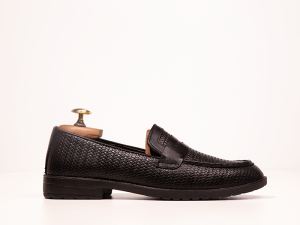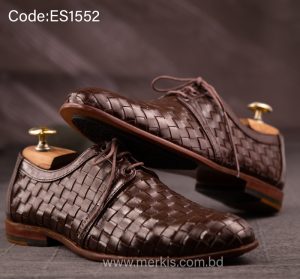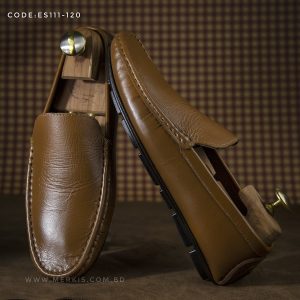Panjabi Sandals for Men – Eid & Prayer Ready
In stock
- Soft and comfortable to wear
- Long-lasting and durable
- Trendy and stylish design
- Size: European: 39, 40, 41, 42, 43, 44
- If you face any size issues then we will replace the size
2,950.00৳ 3,450.00৳
Panjabi Sandals for Men – Tradition Meets Contemporary Comfort
Footwear plays a vital role in shaping a man’s overall personality. In South Asian fashion—especially in Bangladeshi, Indian, and Pakistani cultures—there is a timeless footwear staple that has remained stylish across generations: Panjabi Sandals for Men.
These sandals are more than just casual footwear; they are deeply rooted in cultural heritage, blending tradition with modern-day functionality. Whether worn during Eid, weddings, Jummah prayers, or daily traditional attire, Panjabi Sandals for Men complete the look with unmatched elegance.
In this article, we explore everything about Panjabi sandals—from their cultural significance and materials to styling tips and why every man should have at least one pair in his wardrobe.
Understanding the Legacy of Panjabi Sandals
The term Panjabi Sandals for Men refers to traditional open or semi-open leather sandals typically worn with Panjabi (also known as kurta) attire. The design has evolved over time—from basic leather straps to premium, cushioned soles and modern styling details—yet its cultural soul remains intact.
In Bangladesh, these sandals are a staple during religious occasions, family functions, and national events. They offer a graceful yet grounded vibe that modern shoes often miss. What makes Panjabi Sandals for Men so special is their ability to merge simplicity with style.
Key Features of High-Quality Panjabi Sandals for Men
When shopping for the perfect pair, it’s important to understand what sets great Panjabi sandals apart:
1. Premium Leather or PU Materials
Most traditional versions are made of genuine or synthetic leather. High-end Panjabi Sandals for Men use premium full-grain or soft leather that molds to the feet over time, offering both durability and comfort.
2. Cushioned Inner Soles
Modern Panjabi sandals often come with foam or memory-foam insoles to reduce foot fatigue—especially during long prayer sessions or festive gatherings.
3. Hand-Stitched Detailing
Artisan craftsmanship is a signature of authentic Panjabi Sandals for Men. Hand-stitching along the edges gives a rustic yet refined finish.
4. Slip-Resistant Rubber Outsoles
To prevent slipping on smooth mosque tiles or marble floors, many brands now include anti-slip soles with deep grooves for better grip.
5. Adjustable Straps or Buckles
While traditional versions are slip-on, some contemporary versions come with buckles or Velcro for a better fit.
Occasions to Wear Panjabi Sandals for Men
The versatility of these sandals is one of their strongest attributes. Here are the top occasions where Panjabi Sandals for Men shine:
● Religious Events
Eid-ul-Fitr, Eid-ul-Adha, and Jummah prayers are occasions where traditional attire is encouraged. A crisp white Panjabi paired with leather sandals creates a clean, spiritual look.
● Weddings and Ceremonies
Whether you’re a guest or part of the groom’s party, nothing completes a sherwani or Panjabi-pajama like a pair of classy sandals.
● Cultural Celebrations
Pohela Boishakh, Milad Mahfils, and other cultural days are perfect for flaunting ethnic wear. These sandals strike the perfect balance between festive and formal.
● Casual Ethnic Outings
Even during daily wear at home or for casual errands, pairing a cotton Panjabi with comfortable sandals can make you look effortlessly elegant.
Why Panjabi Sandals for Men Are Better Than Regular Sandals
While there are countless types of sandals on the market, Panjabi Sandals for Men offer several advantages when styled with traditional or semi-formal South Asian outfits:
-
Cultural Compatibility: They complement Panjabi, kurta, and jubba better than sports sandals or slides.
-
Respectful Aesthetic: In religious settings, such sandals add to the respectful tone.
-
Breathability: Many designs allow for air flow, which is ideal for hot climates.
-
Style Versatility: From weddings to mosque visits, the same pair can be worn across different formalities.
Types of Panjabi Sandals for Men
The variety of designs in this category ensures that there’s something for every age and preference:
1. Kolhapuri Sandals
Popular in both Bangladesh and India, these are traditional handcrafted leather sandals with T-straps and a minimalist feel.
2. Peshawari Sandals
Originating from Pakistan, these have a closed toe, a back strap, and thick soles. They’re very popular during Eid and look regal with festive wear.
3. Mojari-Style Sandals
These have a curved toe and ornate stitching, ideal for groom wear or formal events.
4. Modern Buckled Sandals
Blending tradition and modern fashion, these sandals come with adjustable metal buckles and rubber soles.
5. Slip-On Leather Sandals
Simple and elegant, these are ideal for older men or anyone who prefers ease without sacrificing traditional appeal.
Popular Colors in Panjabi Sandals for Men
While black and brown dominate the market, modern brands are also experimenting with other shades to suit diverse fashion tastes.
-
Classic Black – Ideal for formal events and versatile with all outfits.
-
Rich Brown – Adds warmth and goes well with beige, cream, or white Panjabis.
-
Tan/Camel – Stylish and youthful, suitable for daytime events or summer Eid.
-
Navy or Olive – Perfect for fashion-forward men looking to experiment while staying cultural.
How to Style Panjabi Sandals for Men
Creating the perfect ethnic look requires harmony between clothing and footwear. Here’s how you can style your sandals:
● Eid Outfit
-
White cotton Panjabi with golden embroidery
-
White pajama or churidar
-
Brown or black Panjabi sandals
-
Optional: Waistcoat for added flair
● Wedding Guest Look
-
Light pastel Panjabi
-
Golden churidar
-
Ornate or buckled sandals in tan or brown
-
Optional: Silk shawl or dupatta
● Casual Summer Look
-
Light cotton kurta
-
Slim pajama
-
Simple tan slip-on sandals
-
Sunglasses and a wristwatch
Caring for Your Panjabi Sandals
High-quality sandals are an investment, and proper care will increase their life and maintain their beauty:
-
Clean Regularly – Use a dry cloth to remove dust. Avoid water exposure for leather.
-
Polish – Apply neutral or matching shoe polish occasionally.
-
Store Properly – Use a shoe rack or cotton bag to prevent dust and cracks.
-
Avoid Wet Surfaces – Traditional leather sandals can warp if soaked.
-
Don’t Overbend – Bending the soles too often can damage the stitching.
Brands and Artisans to Look For
Many renowned and local brands now produce excellent Panjabi Sandals for Men. Whether you’re buying from a boutique or online, here are names to look out for:
-
Aarong – Known for high-quality handcrafted sandals in Bangladesh.
-
Bata and Apex – Budget-friendly and widely available.
-
Handmade Artisan Brands – Local cobblers and online Facebook pages often sell stunning handcrafted options.
-
Pakistani Brands – Many brands like Stylo or Servis offer Peshawari-style sandals that work beautifully with Panjabis.
Online Shopping Tips for Panjabi Sandals for Men
If you’re buying online, keep these things in mind:
-
Check Material: Genuine leather or PU should be clearly mentioned.
-
Read Reviews: Pay attention to comfort and durability feedback.
-
Know Your Size: Asian and European sizes can differ—measure foot length in cm.
-
Look for Return Policies: Just in case the fit or color isn’t right.
Cultural and Religious Significance
For many, wearing Panjabi Sandals for Men is not just about looking good—it’s a spiritual and cultural expression.
In Jummah prayers, Islamic festivals, or even at family gatherings, men often prefer modest and traditional clothing. These sandals offer the right balance of cultural respect, elegance, and comfort.
They are especially important during Ramadan and Eid, where the entire attire is symbolic of purity, gratitude, and festivity.
Panjabi Sandals as Gifts
These sandals make thoughtful gifts for:
-
Fathers on Father’s Day or Eid
-
Husbands and Boyfriends with a taste for traditional fashion
-
Sons or Nephews for their first Eid prayer
-
Friends and In-Laws during weddings or pujas
Packaging them in a nice box along with matching Panjabi or cap adds a special touch.
Conclusion: The Ideal Blend of Heritage and Style
In a world that’s rapidly modernizing, holding onto cultural heritage is both powerful and beautiful. Panjabi Sandals for Men are a fine example of how traditional fashion can evolve while keeping its essence alive.
They’re more than footwear—they’re an expression of identity, elegance, and modesty. Whether you’re attending a religious event, a family function, or simply enjoying a casual day in ethnic attire, these sandals ensure you walk with pride and comfort.
Investing in a quality pair means you’re not just buying shoes—you’re embracing a timeless tradition. So the next time you dress in your favorite Panjabi, don’t forget to finish the look with the perfect pair of Panjabi Sandals for Men.
About Merkis
Men’s shoes make up a sizable portion of the footwear market in Bangladesh. Merkis works with various foreign shoe manufacturers to expand the market for these shoes. At Merkis, there is a variety of men’s shoes. Please contact us if you have any questions regarding a product on the list. We’ll make every effort to respond to you as soon as possible. Find out when the most recent batch of everyday runners go on sale by following our website and social media accounts on Instagram and Facebook.












There are no reviews yet.